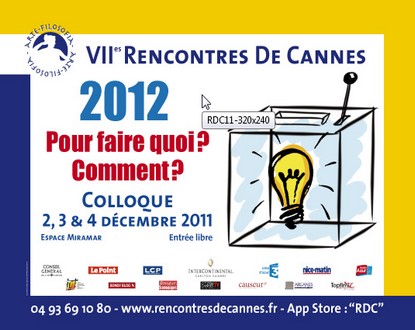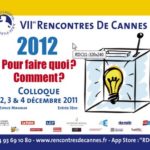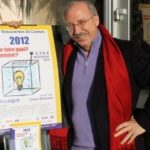The 7th Cannes Meetings open their doors this afternoon at the Espace Miramar in Cannes, with numerous panel discussions featuring prestigious guests, focusing on a key topic: the 2012 presidential election.
Impossible governance, the post-G20 era, ecology, web campaigns, and even equity will be topics discussed and debated throughout the weekend.
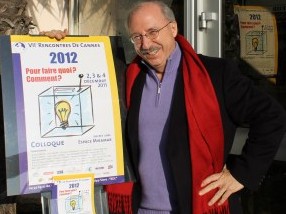 François Lapérou is naturally optimistic. His ideal: to make knowledge accessible to all. His key words are “justice and truth.” Founder of Arte-Filosofia, a cultural association in Cannes, he has been organizing the Cannes Meetings for seven years. It’s an opportunity to bring together journalists, politicians, and intellectuals on topics for the future. A way to provide the public with ideas for reflection. Interview.
François Lapérou is naturally optimistic. His ideal: to make knowledge accessible to all. His key words are “justice and truth.” Founder of Arte-Filosofia, a cultural association in Cannes, he has been organizing the Cannes Meetings for seven years. It’s an opportunity to bring together journalists, politicians, and intellectuals on topics for the future. A way to provide the public with ideas for reflection. Interview.
How did the idea for the theme “2012 What for? How?” come to you?
I’m not a supporter of any party. The Cannes Meetings are neither a forum nor a political convention. I asked myself the question: will ideas emerge from this election? The poster reflects this concept. We see a transparent ballot box with a light bulb inside. It’s a little nod to Eureka [in ancient Greek: “I have found it!”] by Archimedes. During these Meetings, ideas will emerge and offer the public new perspectives. That’s my bet!
How did these six themes emerge?
Behind these panels, there’s a methodology and coherence. We chose a number of issues. First, institutions are needed for the country to function properly. That’s why the first panel talks about governance. Then, we can question whether these institutions are adequate or obsolete. Projects must be economically feasible. The second panel deals with the economy. But first of all, we must ask what use it is if we destroy the planet. Ecology and equity are also addressed.
What’s the brief of the Meetings?
It’s an impossible program to maintain. I must respond to four contradictory demands. An aging Cannes demographics that we must interest: the room must be filled. Then, national speakers we must intellectually excite: I must provide them with challenges. The topic must be a current issue: preparing a current topic nine months in advance is nothing short of a miracle! And finally, the topic must fit the national media’s brief: it must be aired on TNT because the debates will be broadcast on the parliamentary channel LCP. Managing these constraints is complicated.
How do you involve the youth in this conference?
For several years, I’ve been working with schools in Cannes. Lycée des Coteaux is responsible for hospitality, IUT of Journalism for media coverage, and the BTS Audiovisual for image capture. For the first time, we’ve set up a “special student” debate. Students from Stanislas, Carnot, and Bristol intervene on a problem prepared beforehand: Infinite growth in a finite world, is it possible? Young people have the opportunity to ask questions about their future.
By the way, what are the novelties of this seventh edition?
These are the off-Meetings. We gave carte blanche to associations and schools to organize their own debates. About a hundred students and a dozen teachers participate actively. Additionally, there will be a concert-reading on Saturday at 7:30 pm at the Miramar space. Leili Anvar and Frédéric Ferney will read texts by La Fontaine, accompanied by a piano improvisation by Karol Beffa. The choice is not trivial. In all the fables, there is the key to all human behaviors.
In summary, what is the purpose of the Cannes Meetings?
A lot is happening at the moment. Let’s try to shed light on them. Here, you browse ideas like you would at the Forville market: you buy fruits and vegetables, go home, and cook. It’s the same here. At the Meetings, the spectator gathers a selection of ideas by listening to intellectuals. Of course, they shouldn’t be assimilated without reflection. My goal is to give people all the means to think for themselves. My ideal: intellectual independence.
Interviewed by Nora Bouarioua and Emilie Roze
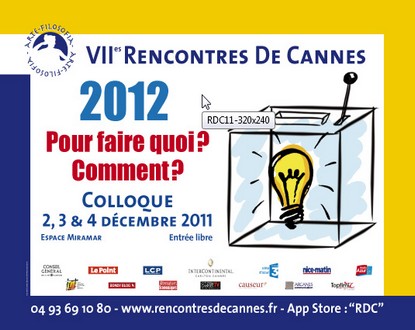 Program of the 2011 Cannes Meetings:
Program of the 2011 Cannes Meetings:
Friday, December 2: Espace Miramar
- 2:30 pm : Opening of the Cannes Meetings 2011
- 3:30 pm : Panel discussion n°1: Impossible government, improbable governance?
The profession of politics has changed: placed under media spotlight 24/7, subject to international and economic constraints, facing ever-increasing complexity, the politician has ceased to be a solitary and all-powerful decision-maker. His room for maneuver is reduced as his responsibility grows. He is hated, defamed, ridiculed, demonized, stuck… Who still wants to govern today? Where does the reality of power lie?
Moderator: Frédéric Ferney
Speakers: Alain Cabras – Eric de Montgolfier – Jean-François Mattéi –
Pierre-Henri Tavoillot.
- 5:00 pm : Panel discussion n°2: Economy: after the G20, regulate yes, but how?
Democracy means control by the people of their own destiny. However, part of this destiny seems to have become uncontrollable: the economy is a
process without subject or project that resembles a headlong rush. No end, no law, but a spiral that risks sweeping away businesses, states, … and people. Is it still possible to domesticate financial and globalized capitalism? Can we hope to regain control? … and what control?
Moderator: François Lenglet
Speakers: Philippe Askenazy – Jean-Marc Daniel – Philippe Frémeaux –Bernard Perret.
- 7:00 pm : Opinion piece by Roland Cayrol
Saturday, December 3:
- 2:00 pm : Panel discussion n°3: Ecology, ecology! What ecology?
Climate change, resource depletion, nature conservation, …: the speed with which environmental concern has become a major issue for our citizens will astonish tomorrow’s historian. But what ecology are we talking about? Is it a new ideology born and fed by the messianic project of “saving the planet”? Or is it an aspiration to find some measure in the wildest dreams of late modernity? Are we heading towards an ecology of “concerned citizens”, experts, activists? And especially how to decide on these terribly complex and uncertain subjects that nevertheless engage the future far beyond electoral deadlines?
Moderator: Elisabeth Lévy
Speakers: Alain Cabras – Philippe Frémeaux – Jean-François Mattéi
-Bernard Perret.
- 3:30 pm : Panel discussion n°4: The Presidential E-campaign
Dreams for some and nightmares for others: have new technologies revolutionized politics? Faster, more transparent, more responsive, more interactive than ever: how to think about these very (too) immediate media? How to keep them at a reasonable distance from advertising (reducing public space to commercial) and propaganda (reducing public space to power) to put them at the service of a more enlightened opinion?
Moderator: David Abiker
Speakers: Emery Doligé – Benjamin Lancar – Benoit Thieulin.
- 5:00 pm : Panel discussion n°5: EQUITY, a new idea for living together?
The crisis forces us to question what had become obvious: we live together! What is the strength of the collective bond, its reason for being, its profound reason? Within the company, the school, the nation, Europe, the motives for cohabitation, solidarity, and mutual aid are questioned when the storm comes. Do we really have clear ideas on this subject that peace and prosperity had almost made us forget? How to think and do justice in rough times?
Moderator: Nordine Nabili
Speakers: Jean-Marc Daniel – Philippe Frémeaux – Yvan Gastaut – Pierre- Henri Tavoillot.
- 7:00 pm : Opinion piece by Roland Cayrol
-
7:30 pm : Theatre – The Political La Fontaine.
Show conceived by Leili Anvar with Leili Anvar and Frédéric Ferney.
piano improvisation by Karol Beffa
Sunday, December 4:
- 1:30 pm : Espace Miramar, exclusive first screening of the debate
recorded under live conditions for LCP, that very day –
Journalists, guilty or not guilty?
Moderator: Gérard Leclerc
Speakers: Franz-Olivier Giesbert – Jean-François Kahn.
- 3:00 pm : Panel discussion n°6: Journalism, old vs new.
Has the profession changed? Is journalism done differently in the digital age? Does digital change the way we write, think, or reflect? Does form take precedence over substance? What’s happening? Isn’t our relationship to time evolving? Digital pursues the technological acceleration of history, particularly since the steam engine. Capitalist logic, with profit as engine and goal, the ever-increasing consumption for the maximum number of people accelerates everything. Slowness becomes a luxury. The old vs the new? Isn’t it becoming slow journalism vs fast journalism? Will monetarist economic logic still impose its rules in the current world, as always?
Moderator: Elisabeth Lévy
Speakers: Olivier Biscaye – Franz-Olivier Giesbert – Jean-François Kahn – Nordine Nabili.
